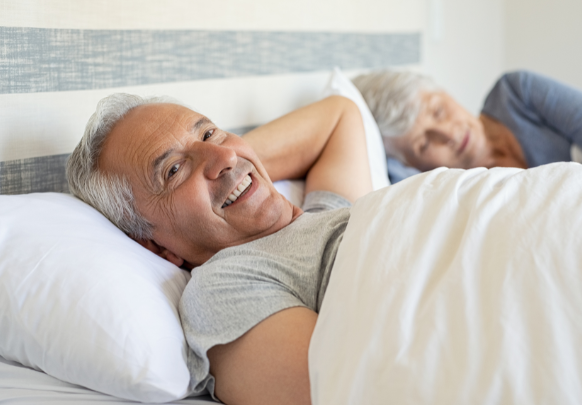The Importance of Sleep Hygiene: Helping Seniors Get a Good Night’s Rest
As we age, getting a full night’s sleep can become more challenging, whether it’s due to changes in our body’s internal clock or other health issues. That’s why establishing good sleep hygiene is essential. It’s not just about how much sleep you get—it’s about creating the right environment and habits to ensure quality rest.
Lawrence Hobart
1/21/20253 min read


Welcome back to CareTec’s ongoing series on senior health! So far, we’ve covered a wide variety of topics, all aimed at helping caregivers and seniors navigate the physical and mental changes that come with aging. As always, CareTec remains dedicated to using AI technology to monitor health patterns and ensure early intervention when necessary.
In our last blog, “Gardening for Health: Why Seniors Should Get Their Hands Dirty", we explored how gardening can benefit both the body and mind. It’s a wonderful way for seniors to stay active, reduce stress, and enjoy a sense of accomplishment.
Today, we’re shifting to a topic that might sound simple but can greatly impact overall health—sleep hygiene. While we often think of sleep as just part of our daily routine, good sleep habits are essential, especially for seniors. Let’s take a closer look at how maintaining proper sleep hygiene can promote better rest and improved health.
As we age, getting a full night’s sleep can become more challenging, whether it’s due to changes in our body’s internal clock or other health issues. That’s why establishing good sleep hygiene is essential. It’s not just about how much sleep you get—it’s about creating the right environment and habits to ensure quality rest.
Why Sleep Hygiene Matters for Seniors
Good sleep hygiene can make a big difference in how well seniors sleep and how they feel throughout the day:
Improves overall health: Quality sleep is crucial for maintaining cognitive function, immune health, and emotional well-being. Poor sleep can increase the risk of health issues like heart disease, depression, and even memory problems.
Regulates mood: Seniors who get better sleep tend to experience more stable moods and less irritability. A regular sleep routine helps regulate mood by reducing feelings of anxiety or restlessness.
Boosts energy and concentration: A good night’s sleep leads to better daytime functioning. Seniors who practice good sleep hygiene often report feeling more alert, focused, and energetic during the day.
Sleep Hygiene Tips for Seniors
Here are some simple ways to help improve sleep hygiene for seniors:
Establish a bedtime routine: Going to bed and waking up at the same time every day helps regulate the body’s internal clock. Encourage relaxing activities before bed, like reading or listening to calming music.
Create a comfortable sleep environment: Ensure the bedroom is cool, quiet, and dark. A supportive mattress and comfortable pillows can also improve sleep quality.
Limit screen time before bed: The blue light from phones, tablets, and TVs can disrupt the body’s production of melatonin, a hormone that helps regulate sleep. Encourage seniors to turn off screens at least an hour before bed.
Watch out for caffeine and heavy meals: Drinking caffeinated beverages or eating large meals late in the day can make it harder to fall asleep. Opt for lighter dinners and avoid coffee or tea in the afternoon or evening.
Stay active during the day: Physical activity can improve sleep quality, but it’s best to avoid vigorous exercise too close to bedtime.
When to Be Concerned
While some sleep disruptions are common in aging, ongoing trouble with sleep might indicate an underlying issue:
Chronic insomnia: If a senior is consistently having trouble falling or staying asleep, it could be due to mental health concerns like anxiety or depression, or even sleep disorders.
Sleep apnea: Seniors who snore loudly or wake up feeling tired may have sleep apnea, a condition where breathing repeatedly stops and starts during sleep.
Frequent waking during the night: Waking up frequently could be a sign of bladder issues, medication side effects, or other health concerns that should be discussed with a doctor.
Disclaimer:
This blog is intended for informational purposes only and should not replace professional medical advice, diagnosis, or treatment. If you or a loved one is experiencing sleep issues, it’s important to consult a healthcare provider to determine the best course of action.
Learn more about the author here.
©2025 CareTec.AI
Melbourne: 101 Collins St Melbourne VIC 3000 +613 9999 7379
Sydney: 2 Chifley Square, Sydney NSW 2000 +612 8880 0307
Queensland: 46 Cavill Ave, Surfers Paradise QLD 4217 +617 3667 7473
Texas: 200 W 6th St, Austin, TX 78701 +1 (737) 7101 776
London: 22 Bishopsgate, London EC2N 4AJ +44 (020) 4577 4024


